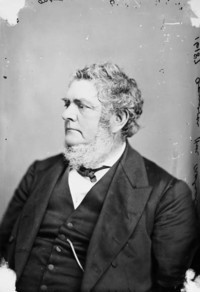by George Mathewson for the Sarnia Observer
(2003) Malcolm Cameron was already an energetic member of the Upper Canada legislature when he moved to Sarnia in 1834 in search of new opportunities. The 27-year-old quickly found them. Before he was through, Cameron helped launch the Observer, named Lambton County, built a shipping empire, and laid down the first road from Sarnia to London. He named most of Sarnia’s streets between George and Wellington: Christina after his wife, Euphemia after his mother, Lochiel for his clan chief. Cameron is rightly regarded, along with Alexander Vidal and George Durand, as one of Sarnia’s founders.
Cameron was a man of strange contrasts. He detested the anti-Catholic Orange Lodge as much as he did Catholic schools. He was the son of an innkeeper and worked in a distillery, yet is remembered as the “Apostle of Temperance” who introduced the first prohibition measure in the Canadian Parliament.
Cameron made a fortune launching businesses and speculating in land. As thousands of Sarnians found out, that free-wheeling legacy still resonates today in the infamous “Cameron Lands” deal. Cameron had negotiated with three local chiefs to buy a huge chunk of the Chippewa reserve in what is now south Sarnia, back in 1839. The Aamjiwnaang First Nation long suspected a swindle and finally filed claim in 1995, alleging that four square miles were never legally surrendered. The courts agreed, and after a seven-year legal battle, the band is currently seeking compensation from the federal and provincial governments.
The Cameron Lands weren’t Cameron’s only questionable transaction, however. The road he built to London bypassed Egremont Road and ruined the village of Errol, then Sarnia’s chief rival. The road ran straight through tracts of bush Cameron had snapped up at swampland prices.
Charges of trickery and land-jobbing dogged Cameron throughout his political life. Unfazed, he brought in settlers to clear Cameron lands of trees sawn at the Cameron mill and shipped to markets in Cameron ships. In one year, one-sixth of all the oak timber moved from Canada to Great Britain came from Sarnia and tons of oak staves headed to Jamaica for rum barrels. By 1861, Cameron was worth more that $200,000, a multi-millionaire in relative terms.
The Honourable Malcolm Cameron also made his mark in Canadian politics, serving as Postmaster-General and Agriculture Minister. He died after a lengthy illness in Ottawa on June 1, 1876.


